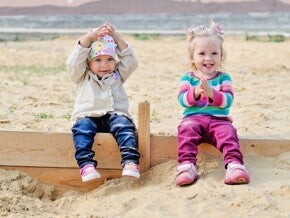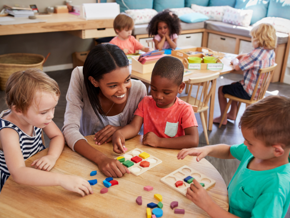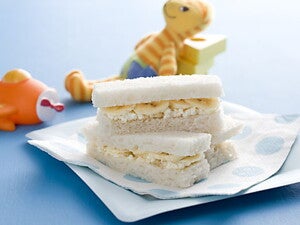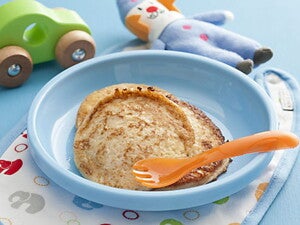
10 Easy Sensory Play Ideas for Two to Three-Year-Olds
Sensory play is vital for a child’s development, helping them explore and understand their world. It can stimulate their senses, promoting cognitive, physical, and emotional development.
Sensory play is a key activity that allows young children to explore and interact with their environment. By appealing to their senses, children can learn, discover, and make sense of their surroundings in a way that supports their cognitive, physical, and emotional development.
Sensory play can take various forms, depending on which sensory skill/s you want to support:
- Sight (Visual): Use colours, shapes, and patterns to stimulate vision. Activities include painting, playing with light and shadow, or observing visually stimulating objects.
- Hearing (Auditory): Focus on activities like listening to different sounds, playing musical instruments, or engaging in rhythmic movements.
- Touch (Tactile): Engage the sense of touch through activities like exploring textures, playing with different materials, or messy play activities with sand, water, or playdough.
- Smell (Olfactory): Include activities like exploring different aromas, smelling various scents, or engaging in cooking and baking.
- Taste (Gustatory): Engages the sense of taste through activities like trying different foods and exploring flavours during cooking or baking.
- Movement (Kinaesthetic): Include activities that involve jumping, hopping, sliding, spinning, kicking and throwing.
By engaging all the six senses, sensory activities help build neural connections, enhance motor skills, develop language and communication abilities, regulate emotions, and fosters meaningful bonding experiences between you and you’re your toddler.
Benefits of sensory play
Sensory play is not only enjoyable for babies and toddlers but also offers numerous developmental benefits. It positively impacts all aspects of their growth and development including supporting their brain, motor skills, and emotional and social wellbeing.
Cognitive development: Sensory play sparks curiosity, fosters problem-solving abilities, and nurtures creativity. When children explore different textures, colours, sounds, and smells, their brains form new connections, promoting brain growth.
Motor skills development: Essential for later activities like writing and sports, activities like squishing, squeezing, pouring, and stacking during sensory play improves fine and gross motor skills, hand-eye coordination, balance, and muscle control.
Emotional and social wellbeing: Sensory play allows children to express emotions, build self-confidence, and develop social skills through cooperation, sharing, and turn-taking. It also helps them regulate emotions and cope with stress and change.
When to start sensory play
Sensory play is a fantastic way to stimulate your child's senses and support their overall development. Generally, you can begin introducing sensory activities as early as 4-6 months old. At this stage, while they won’t be doing the exploring on their own necessarily, babies are aware of their surroundings and eager to experience new feelings and sensations that you expose them to.
As your baby transitions into toddlerhood, sensory play experiences can become more complex, involving activities that engage multiple senses at once, like playing with water and sand. Encouraging exploration of different materials, shapes, and colours in an arts and crafts session will further develop their cognitive and sensory skills.
10 Sensory Play Ideas and Activities
Here are some ideas for indoor and outdoor sensory activities, as well as DIY activities that are not only fun but also promotes overall development.

Always supervise your child during sensory activities and ensure materials are age-appropriate and non-toxic. These sensory play ideas will be a wonderful opportunity for your toddler to explore their senses and learn through play.
Frequently asked questions about sensory play
What are the benefits of sensory play for development?
There are numerous developmental benefits of sensory play for your toddler. Sensory stimulation can help support cognitive, social and emotional growth, as well as language development and fine motor skills. It can also nurture problem-solving skills, creativity and imagination.
Is sensory play the same as messy play?
While sensory play can definitely involve elements of messy play, they are not exactly the same. Sensory play focuses on engaging the six senses (sight; smell, hearing, touch, taste and movement) through various materials and textures, while messy play activities emphasise the exploration with messy materials of different textures and substances.
What is considered sensory play?
Sensory play involves activities that stimulate any of the six senses, such as touch, sight, sound, smell, taste and movement. It can include playing with materials like sand, water, playdough, or exploring different textures, colours, and sounds. Sensory play promotes cognitive development, fine motor skills, and creativity in children.
What do children learn from messy play?
Messy play activities offer valuable learning opportunities for children. Among many developmental benefits, it can enhance sensory exploration, fine motor skills, and hand-eye coordination. It can also encourage creativity, problem-solving, and imaginative thinking. Additionally, messy play can promote social skills, language development, and emotional regulation as children engage in collaborative and sensory-rich experiences.
Which type of play is most common for 3 year olds?
Sensory activities for 3-5 year olds typically involve a variety of play types with so many sensory play ideas to capture your little one’s attention. Pretend play, also known as imaginative or symbolic play, is often a favourite. Imaginative play includes activities like role-playing and engaging in make-believe scenarios to foster creativity and cognitive development. Another favourite is any outdoor play that involves running, jumping, or playing with friends and other family members. These activities promote physical fitness and socialisation.
Sources:
- Starting Blocks website. Accessed at https://startingblocks.gov.au/resources/children-and-services/educational-programs/the-importance-of-play-in-childrens-learning-and-development
- Australian Government Department of Health and Aged Care website. Accessed at https://www.health.gov.au/topics/physical-activity-and-exercise/physical-activity-and-exercise-guidelines-for-all-australians/for-infants-toddlers-and-preschoolers-birth-to-5-years
- Early Childhood Australia website. Accessed at https://learninghub.earlychildhoodaustralia.org.au/wp-content/uploads/2023/02/ISP-Resource-Sensory-Play-FA-web.pdf





